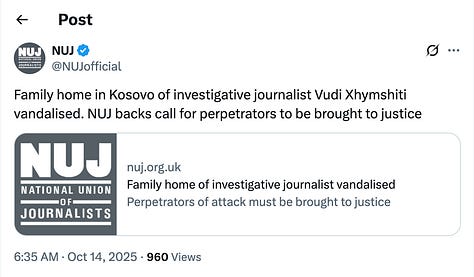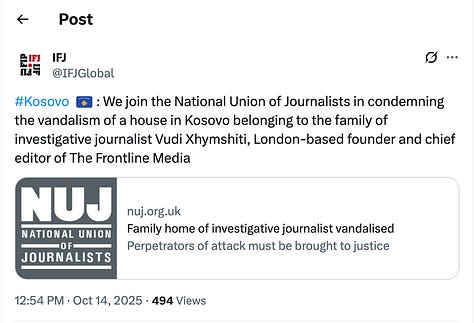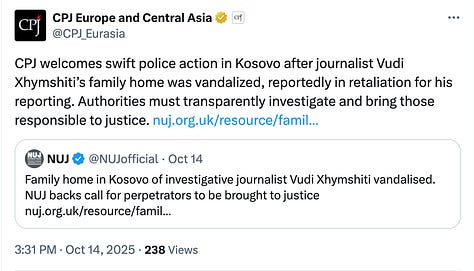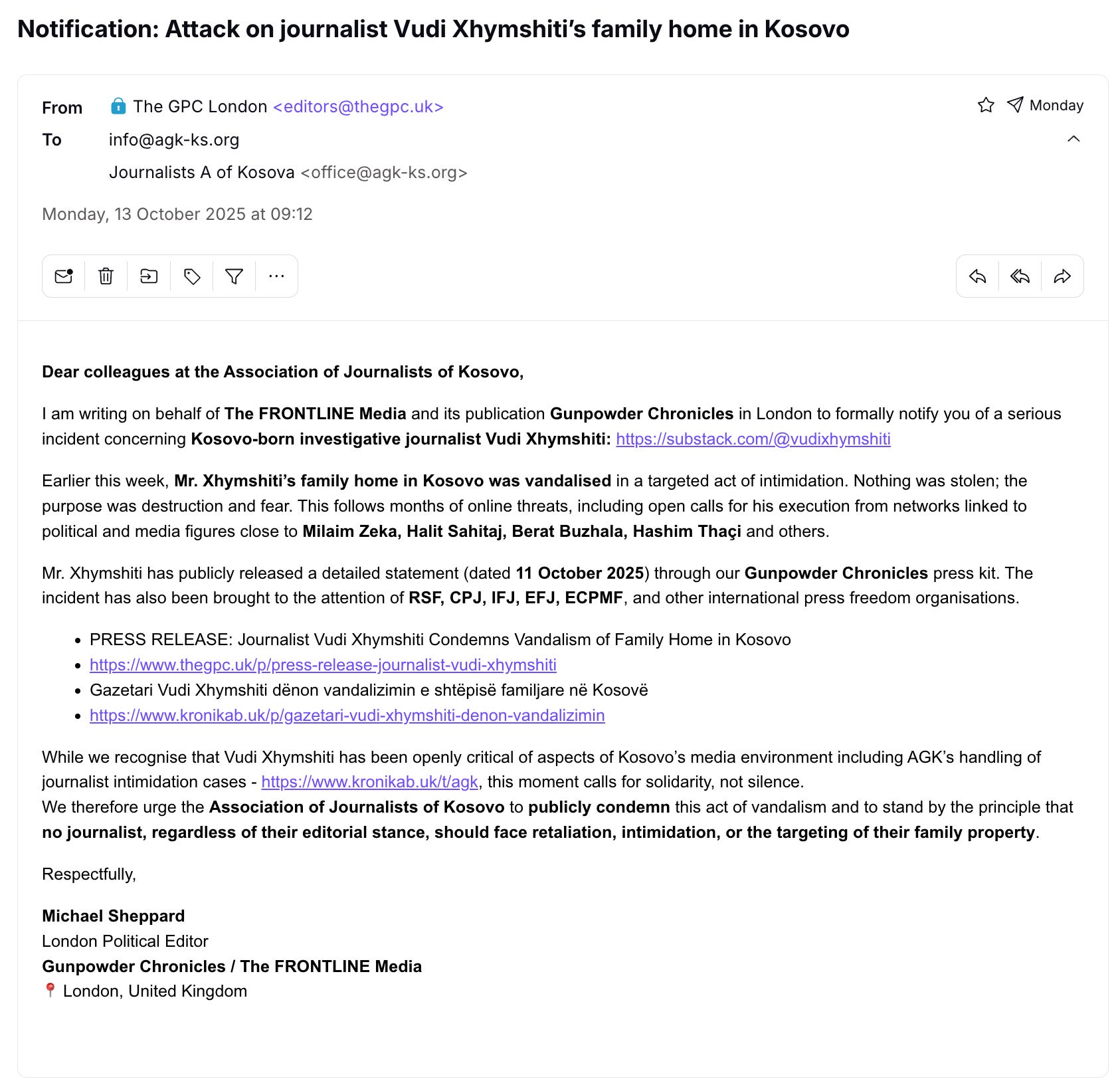The Cartelisation of Kosovo’s Press
AJK’s silence after the vandalism wasn’t neutrality; it was complicity, proof of a cartelised press that protects its patrons, punishes critics, and abandons journalism’s first duty.
I have spent the past fifteen months doing what good journalism always does at its most unfashionable, asking the press to look in the mirror1. The weekend of 11 October 2025, when vandals smashed the windows of my family’s unoccupied house in Kosovo and desecrated our memorial car2, only proved why that mirror is necessary. Nothing was stolen. The point was fear. After months of reporting on Serbian espionage and disinformation networks, after a season of online death threats from circles close to long-entrenched political and media figures, the message was simple: stop. I will not. But what matters, for the record and for the profession, is how we got here and why the people who should have stood first, Kosovo’s Journalists’ Association and the capital’s biggest newsrooms, chose silence.
The chronology is blunt. In July 2024 I documented calls for my killing and the coordinated smear3 that followed an investigation into U.S. diplomats operating as political influencers in the Balkans. The Kosovar Association of Journalists was notified. Nothing. The police dismissed my complaint, the prosecutor dropped the case. Meanwhile, the same association performed public outrage on behalf of an NGO that is not a newsroom at all, but a donor-funded policy influence shop. I wrote then that confusing opinion factories with journalism is dangerous because it launders advocacy as fact, and I named names. The people urging others to shoot a journalist boasted online of their ties to state agencies and their success in getting my case buried. Screenshots and dates are there, the silence from our guild was there too.
In August 2024 I turned to structure, not personality, the Association’s secretive campaign against the EU-aligned draft Law on the Independent Media Commission4. AJK framed its move as a bulwark of freedom, I read the text, listed the safeguards, and asked the obvious question, who benefits when online outlets with opaque funding and blurred editorial lines remain unregulated? I argued that the Association’s doctrine looked less like principle and more like the defence of a status quo in which a handful of outlets enjoy impunity while the public is drenched in noise. I pointed out the pattern of selective outrage, condemnations for show, silence when friends breach ethics and I cited concrete episodes, among them the Association’s rush to shield Nacionale and its proprietor, Berat Buzhala, when they pushed a murder-tinged story against President Osmani5 without verifiable evidence, then postured by threatening to hand “proof” to prosecutors rather than the public. Journalists inform, they do not moonlight as police. I said so. Again, dates, statements, receipts.
In September 2024 I pressed that point. When AJK chose to applaud Buzhala’s tactics and scold those who questioned them, it abandoned its mission. I wrote that straight. I asked the European and International Federations of Journalists to reconsider whether AJK was still fit to be a sister organisation while it defended the indefensible and ducked its own statute6. I also described, with screenshots, the chilling ease with which people who had called for my death sought my car registration and boasted of protection. The Association knew. The Association did nothing.
By December 2024, after Serbia’s Kremlin-aligned propaganda had grown louder, I documented another habit, borrowing moral capital from faraway tragedies to cover domestic failure. AJK’s loud statements on Gaza were, in isolation, humane and correct7. But solidarity is not a costume. Two decades of threats, censorship, and murders of journalists in Kosovo have never inspired the same persistence from the Association. I said so, and I set out why, a system of media influence where donor money, political patronage, and corporate interests cross-subsidise one another and reward compliance. That is not what a small, besieged democracy needs.
February 2025 brought a case study. KOHA Ditore published an item that treated the social-media bile of Richard Grenell and the re-sharing of Donald Trump Jr. as the voice of “the international community”8. It was not a blunder, it was a choice. I wrote, plainly, that elevating partisan messaging to multilateral consensus collapses the distance between error and propaganda. I asked KOHA’s leadership to defend the decision or correct it. Instead, when I issued a polite, public invitation to debate, my comment was deleted and I was blocked9. Earlier still, KTV had recorded a calm hour-long discussion about ethics with me and veteran journalist Agim Kasapolli, then mothballed the programme, whispering that I was “known for fake news”. I asked for evidence three times, in writing. Silence. No citations, no counter-argument, just a decision that a straightforward conversation about how to do the job was somehow too risky to air10. This is message control masquerading as editorial judgement. Deleting the invitation to debate and locking the critic out is not professionalism, it is fear of the audience.
In September 2025, when the censored debate finally surfaced elsewhere11, the point became undeniable, too many of Prishtina’s gatekeepers are allergic to scrutiny when the subject is themselves. That allergy is cultural and it is costly. Donors shape beats and prizes shape taste. In September 2024 I had already written about the EU’s Investigative Journalism Awards and how, since the EULEX scandal12, the award ecology has channelled reporters into “safe” targets while powerful international actors escape sustained examination. I named Kallxo/BIRN’s haul of first-place trophies and I argued that excellence funded by those who should be scrutinised breeds blind spots. Jeta Xharra responded13 with the brazenness of someone who knows the prize committee is nearby, when I rebutted her arguments in public, the conversation was closed and the door was locked. I was not surprised.
All of this is the spine of what happened the weekend my family home was attacked. On 11 October 2025 I issued a statement, months of in-depth work on Serbian espionage and disinformation had provoked an intimidation attempt, nothing was stolen, a memorial car to my late father was desecrated, the house had already been burned by Milosevic’s forces in 1999 and was again a target, now in peacetime, to send a message. I named, as I have for years, the domestic networks that amplify foreign narratives and try to police the profession through threats and smears. I called for a transparent investigation. Within forty-eight hours the National Union of Journalists reacted14, followed by the International Federation of Journalists15. CPJ welcomed swift police action and insisted on accountability16. These organisations judged the act, not their feelings about my writing. That is what professional solidarity looks like.



In parallel, on 13 October, my political editor Michael Sheppard wrote to the Association of Journalists of Kosovo. The letter acknowledged our public disagreements with AJK’s leadership and asked for the minimum any guild owes its critics, condemn the intimidation, back the demand for a real investigation, show the public that the red line is clear. By Thursday, 16 October, nothing. Not a sentence. The biggest newsrooms in Prishtina chose the same path. Several regional and diaspora outlets carried the story17. Kosovo’s mainstream, for the most part, did not.

Why Silence?
Because my archive leaves them no comfortable place to stand. KOHA would have to explain why it platformed a narrative that dressed partisan fury up as the voice of NATO and the EU and why a basic ethics programme was shoved in a drawer. KTV would have to explain why it whispered “fake” without producing a single example. Kallxo would have to acknowledge that my September 2024 analysis of the awards economy cut too close to its business model and reputation. AJK would have to admit that its doctrine of selective outrage roaring for friends, mute for critics, is not ethics at all but club protection. These actors chose calculation over principle.
They are wrong, again, for four simple reasons.
First, the target on that weekend was not me, it was journalism. Vandalising a journalist’s family property to frighten him off a line of reporting is a textbook attack on the press. A guild that waits to see whether it likes the journalist before it condemns the attack is not a guild.
Second, credibility is arithmetic, the rule you apply to your allies must be the rule you apply to your critics, or the public will file your next defence of “press freedom” under public relations.
Third, Kosovo is an information front line. When Belgrade-aligned narratives and their local proxies work to recode pressure as policy and neutralise reform through noise, our answer cannot be to bury inconvenient cases and punish internal dissent.
Fourth, the audience is not stupid. People can dislike my tone and still know that smashing a reporter’s windows is unacceptable. Treating citizens as if they cannot hold two thoughts at once is an insult they notice.
What should have happened is not complicated. AJK should have issued a short, unequivocal condemnation with a line that says: we have disagreed strongly with Mr Xhymshiti’s critiques of us, those disagreements are irrelevant when intimidation is the instrument. KOHA, KTV and Kallxo should have run 300 words on the facts with a transparent editor’s note acknowledging prior disputes. The Independent Media Commission should have reminded every major outlet that threats and vandalism against journalists are matters of public interest, not factional mood.
What I ask now is also not complicated. Adopt a victim-agnostic protocol at AJK: condemn first, debate later, always. Publish funding footprints and conflicts prominently at the outlets that take the most donor money and prizes, especially when covering those donors and their missions. Rehabilitate debate as a professional virtue, answer criticism with argument, not deletion and blocks. And bring our unresolved domestic ledger of attacks on journalists into the light with the same energy we show for tragedies abroad. It is not either/or. It must be both/and.
I know exactly what the hostile outlets aligned with Belgrade will do with this piece, nothing, or worse than nothing. I know what the prize committees and their favourites will do, keep smiling, keep awarding, keep telling themselves that critics are jealous rather than right. I know what some editors in Prishtina will do, pretend not to have seen this, as they pretended not to have seen the attack itself. All of that is the noise of a system that would like the public to forget that accountability begins at home.
Here is the part that matters. On 11 October a vandal’s brick tried to close a file. On 13 and 14 October, the NUJ, IFJ and CPJ opened it wider. On 16 October, the Association of Journalists of Kosovo and several leading outlets confirmed with their silence what I have written since last year, too many of our gatekeepers confuse their reputations with the public interest and mistake message hygiene for ethics. They call criticism “hostility” and censor ethics conversations while elevating partisan feeds to the rank of international consensus. They teach the worst people in our politics that the price of intimidating reporters is low.
I do not write this for them. I write it for readers who still expect journalism to be a civic good. The evidence is chronological and public, the ignored death threats of July 2024, the lawfare masquerading as principle in August, the Buzhala scandal and AJK’s complicity in September, the borrowed virtue of December, the KOHA/KTV gatekeeping and the “international community” fiction in February, the awards economy that de-risks scrutiny in September, the censorship now exposed and, finally, the brick. The pattern is not subtle. It is a map.
I will keep reporting. The FRONTLINE Media will keep publishing. The Gunpowder Chronicles will keep documenting both the foreign networks that would like Kosovo softened for re-capture and the domestic habits that make their work easier. The people who smashed my late parents’ windows did not break my resolve, they confirmed it. And the people who chose silence confirmed something else, that our profession will only be as free as we are willing to be with one another. If you can only defend your friends, you are not defending the press. You are defending a club.
I do not belong to that club. I belong to the public.
“Fourth Estate Critique” delves into the quality of news reporting and political discourse, challenging the media’s role in shaping public opinion and policy. This section of the newsletter offers sharp, informed analysis aimed at fostering transparency and accountability in journalism, providing essential insights for media professionals and critical readers alike. — The GPC Media Watch.
PRESS RELEASE: Journalist Vudi Xhymshiti Condemns Vandalism of Family Home in Kosovo
Investigative journalist Vudi Xhymshiti condemns the vandalism of his family home in Kosovo, calling it a criminal intimidation linked to his exposés on Serbian espionage networks. — The GPC Press Release.
Journalists Under Siege: S Bunker’s and AJK’s Shadow Campaign
Calls for my death and threats from Rinor Muia, coupled with S Bunker’s smear campaign, highlight the alarming dangers facing journalists in politically charged environments. — The GPC Media Watch.
AGK Defends Status Quo, Threatens Kosovo’s Press Freedom
AGK’s secretive opposition to Kosovo’s media law exposes a disturbing agenda: protecting corrupt interests over press freedom, undermining democracy, and evading transparency and accountability. — The GPC Media Watch.
Media Ethics Under Fire: AGK’s Role in Buzhala Scandal
AGK’s support for a journalist accused of unethical practices challenges its mission, prompting calls for a reevaluation of its role in protecting press standards. — The GPC Media Watch.
The Capture of Kosovo’s Media: Open Letter to Defenders of Press Freedom
Kosovo’s media faces a crisis as investigative journalists are intimidated by organised crime networks. Immediate international action is needed to protect press freedom. — The GPC Media Watch.
Gaza and the AJK Cartel: Journalism for Sale
This isn’t solidarity. It’s a grotesque attempt to borrow moral capital from Gaza to whitewash decades of complicity in Kosovo. — The GPC Media Watch.
When the Media Becomes the Messenger of Misinformation: The KOHA Ditore Debacle
KOHA Ditore’s portrayal of Grenell and Trump Jr. as voices of the ‘international community’ is a blatant distortion, undermining journalistic integrity and factual accuracy. — The GPC Media Watch.
Flaka Surroi and the Art of Silencing Dissent
Flaka Surroi preaches democracy but silences dissent. When media gatekeepers delete criticism instead of debating it, is it journalism, or just another tool of power? — The GPC Media Watch.
Silenced: Journalism Under Fire at KTV
Censorship at KTV reveals the deep cracks in Kosovo’s media landscape, where politics overrides ethics, and truth struggles to find its voice. Stand for accountability. — The GPC Media Watch.
The Debate Flaka Surroi Didn’t Want You to See
Now, thanks to Nexha Gjema, you can. The recording once censored is finally aired, a victory for accountability and journalistic integrity. What follows is what you were not meant to see. — The GPC Media Watch.
EU Journalism Awards: A Tactic to Muzzle Kosovo’s Investigative Reporters
The EU’s awards for investigative journalism in Kosovo are not about promoting excellence—they’re about suppressing scrutiny and controlling the narrative of corruption. — The GPC Media Watch.
Jeta Xharra’s response Facebook Debate, Sept 26, 2024.
Argumentum.al: Gazetari investigativ Vudi Xhymshiti denoncon vandalizmin ndaj pronës së familjes së tij në Kosovë: “Frikësimi nuk do të më ndalë”
SYRI TV: Sulmohet banesa e gazetarit Vudi Xhymshiti në Kosovë: Akt që rikujton brutalitetin e Millosheviçit
Politiko.al: Sulmohet banesa e gazetarit Vudi Xhymshiti në Kosovë: Akt që rikujton brutalitetin e Millosheviçit / Journalist Vudi Xhymshiti’s apartment in Kosovo attacked: An act that recalls Milosevic’s brutality
Politiko.al: The British Union of Journalists condemns vandalism at the home of journalist Vudi Xhymshiti in Kosovo.
Kosova News: Gazetari Vudi Xhymshiti dënon vandalizimin e shtëpisë familjare në Kosovë
Kosova News: Organizatat ndërkombëtare reagojnë, për sulmin ndaj shtëpisë së prindërve të gazetarit Vudi Xhymshiti.
MCN TV: Gazetari Vudi Xhymshiti dënon vandalizimin e shtëpisë së familjes në Kosovë
Kosova Post: Gazetari Vudi Xhymshiti dënon vandalizimin e shtëpisë familjare në Kosovë
Shqip.com: Gazetari Vudi Xhymshiti denoncon vandalizmin e shtëpisë së tij: Akt që synon të heshtë gazetarinë e pavarur.
Syri.net: Bashkimi i Gazetarëve Britanik dënon vandalizmin në banesën e gazetarit Vudi Xhymshiti në Kosovë
RrugaPress.al: Organizatat ndërkombëtare reagojnë, mediat dhe organizatat në Kosovë heshtin, për sulmin ndaj shtëpisë së prindërve të gazetarit Vudi Xhymshiti.


